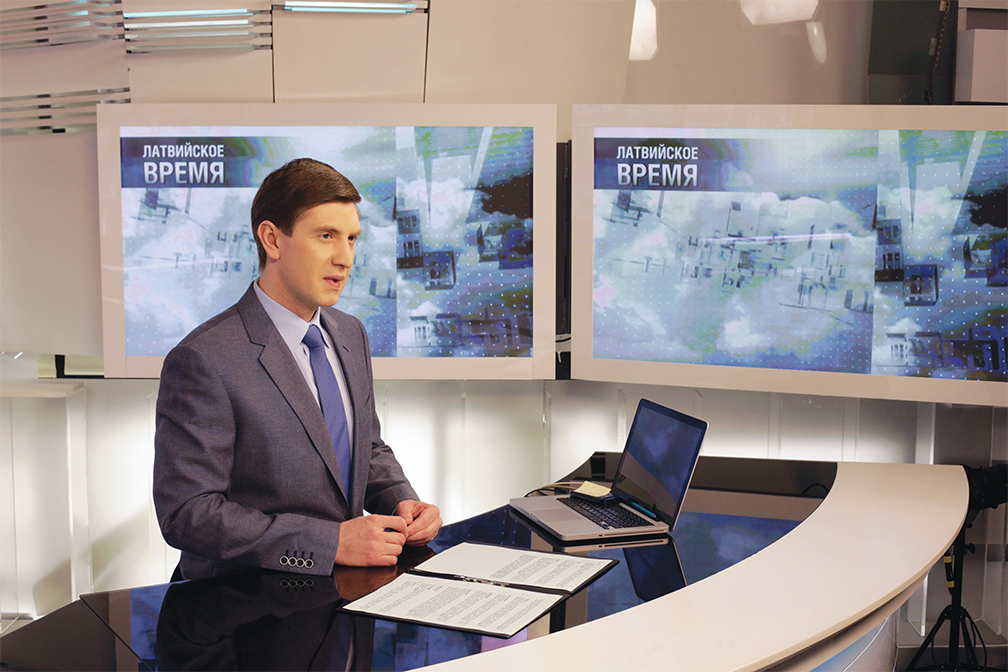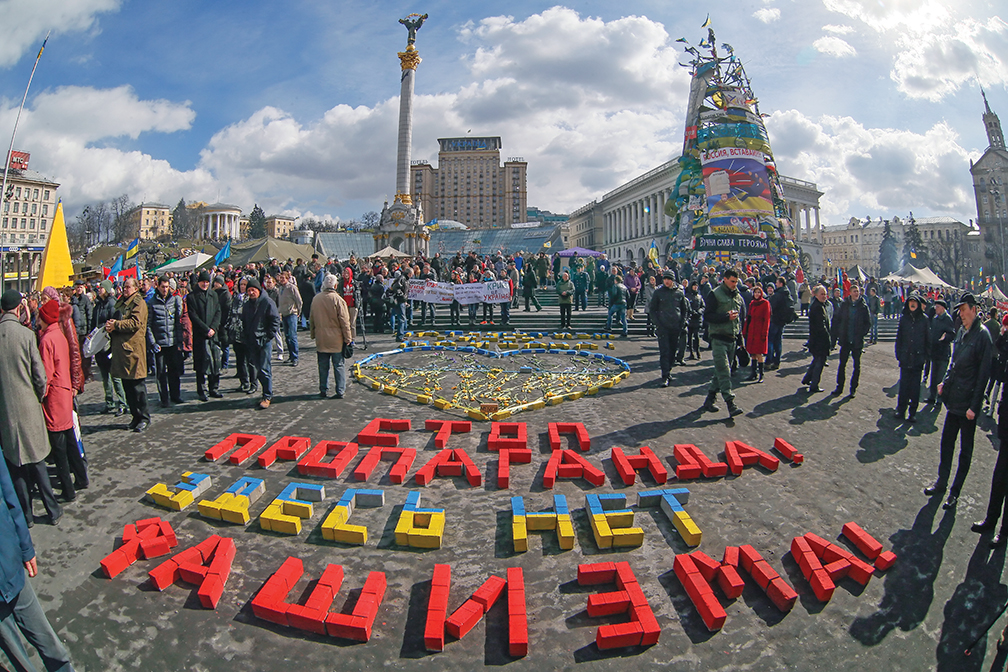Europeans take steps to counter Russian propaganda masquerading as news
In the French newspaper Le Figaro, a pro-Russian supplement is tucked inside. On the surface, it appears to be part of the newspaper, but its overt positive spin on Russian foreign policy and President Vladimir Putin reveals it’s a ploy to persuade readers to believe falsehoods. The Russian propaganda machine running rampant in Europe seeks to confuse and manipulate current news events to offer misleading but convincing theories that show Russia in a positive light. The aim of such media manipulation, in many instances, is to destabilize Ukraine and discredit European leaders who oppose Russia.
In response to this informational onslaught, the European Commission in March 2015 tasked the European Union’s foreign policy chief, Federica Mogherini, with developing a strategic communication plan that would decode these manipulative reports and bring Russia’s information campaign to light. Potential solutions discussed include creating a website spelling out factual deceptions, strengthening media oversight and robustly promoting a pro-Europe narrative. In the meantime, the commission has formed a task force named “Mythbusters” to identify falsehoods in Russian media and issue corrections.
Information warfare is unfamiliar territory for the EU. It is particularly difficult to confront in the Baltic states, with their Russian-speaking minorities, and in Ukraine, where Russian media campaigns have been most intense. EU leaders stressed “the need to challenge Russia’s ongoing campaign of public disinformation about the conflict in Ukraine,” the German press agency Deutsche Presse-Agentur reported.
The most prominent recent Russian propaganda included two big denials: that Russia had shot down Malaysia Airlines Flight MH17 in July 2014 and that the Russian military had entered Crimea just before Moscow seized the territory. When the Malaysian airliner crashed, Russian media reported it had been shot down by Ukrainian forces. Evidence strongly suggests that pro-Russian rebels armed with Russian weapons were responsible. Putin also brazenly refuted claims that his soldiers were in Crimea prior to its unlawful takeover, but later awarded participants with medals.

Russian propaganda reporting can be bizarre and outlandish. For instance, several Russian media news sources, including the daily newspaper Moskovskij Komsomolets and the Russian Defense Ministry’s channel Zvezda, erroneously reported that Ukrainian President Petro Poroshenko “lost touch with reality” when he gave a Ukrainian soldier amputee a soccer ball. Some reports are eccentric enough that the Ukrainian media has turned them into comedy. The Kyiv Post published the “Top 10 Kremlin myths and lies used to justify Russian invasion of Ukraine’s Crimea,” and a photograph has gone viral of a Russian woman who has appeared in numerous Russian media reports using different names each time.
However amusing the reports are, their intent is not. The Russian government is deeply invested in this hybrid warfare, with the goal of discrediting the EU and Eastern European governments. Russian propaganda circulating in Ukraine and Eastern Europe is aimed at inducing hatred toward Ukrainians to justify aggression, security experts say.
Russian news agencies expand
And the means by which Russia can spread its disinformation is growing. RIA Novosti, once considered a balanced Russian news outlet, in late 2014 was transformed into an “aggressive propaganda vehicle of the Kremlin,” according to the Brussels-based think tank Egmont Institute. The name was changed to Rossiya Segodnya, which means Russia Today, not to be confused with RT, the Russian-owned TV network. RIA Novosti will remain in use in Russia.
Rossiya Segodnya combines the former RIA Novosti news service and the international radio service Voice of Russia. And in November 2014, Voice of Russia changed its name to Sputnik. It will focus on radio and Internet presence and will “give alternative interpretations for which there is definitely a demand for in the world,” Dmitry Kiselyov, head of Sputnik News, told Agence France-Presse in November 2014. It is expanding its radio reach to 30 more cities worldwide.
Russia Today is broadening its TV news services to broadcast in the world’s biggest capitals. This growth is particularly worrisome to security experts. “Facts are reported [by Russia Today] with a total lack of due accuracy and impartiality, and undue prominence is given to pro-Russian views and opinions,” the Egmont Institute wrote in November 2014. The disinformation has been so outrageous that a correspondent quit, saying: “It was the most shockingly obvious misinformation and it got to a point where I couldn’t defend it anymore,” The Heritage Foundation reported in October 2014. Some of the boisterous reporting has alleged that the September 11, 2001, attacks in the U.S. were planned by a U.S. deputy defense secretary and that the U.S. created Ebola. “Russia Today’s propaganda machine is no less destructive than military marching in Crimea,” Lithuanian Foreign Minister Linus Linkevicius said in March 2014, The Wall Street Journal reported.
Russia has also hired an army of covert Internet trolls and messengers to post pro-Russian and pro-Putin comments and social media posts, according to EU Observer. “It’s [a] very serious threat,” David Clark, senior research associate at the Foreign Policy Centre, told Newsweek in March 2015. “Propaganda played a significant role in the Ukraine conflict. Behind the scenes it’s plausible that Russia has thousands of people working on social media and on news websites, making interventions and tweeting in order to put the Russian message across.”
Citizens are speaking out against the propaganda. Ukrainian Serhiy Balbeko created a website called Fake Control to dispel the lies. “I got the idea to run this project with a few of my friends because we realized the amount of disinformation that was coming from media, from social networks, from news and press and some others,” he told Radio Free Europe/Radio Liberty. Balbeko explained that they scrutinize photographs, research public information on events and conduct interviews to debunk misinformation.

The effectiveness of Russia’s disinformation campaign is unknown, but a spring 2014 Pew Research study reveals that Europeans have a growing unfavorable opinion of Russia. The survey found that from 2013 to 2014, Europeans increasingly viewed Russia negatively, with the negatives rising from 54 percent to 74 percent.
Europeans eagerly await and support efforts to confront this disinformation. “The Kremlin’s use of disinformation has been laid bare after the shooting down of a Malaysia Airlines passenger plane on 17 July. Europeans must confront the grotesque propaganda machine on which President Putin’s authoritarian rule depends,” William Horsley, former BBC European Affairs correspondent and co-founder of the Centre for Freedom of the Media at the University of Sheffield, wrote in August 2014.
European leaders agree: “We’re up against … a very systematic and pretty sophisticated campaign of misinformation. We know that it’s corrosive … we have to up our collective and individual games,” an EU diplomat stated.


Comments are closed.